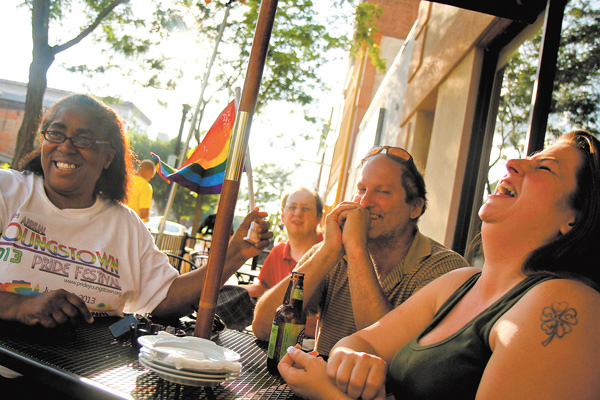Valley same-sex marriage proponents laud SUPCO ruling

RELATED: Historic rulings boost gay rights
By DENISE DICK
denise_dick@vindy.com
YOUNGSTOWN
Proponents of same-sex marriage call it an issue of equality and human rights, and they expect to see the question before Ohio voters within three years.

Celebrating Wednesday’s Supreme Court ruling striking down a key provision of the federal Defense of Marriage Act at the Lemon Grove in downtown Youngstown are from left, Anita Davis, Matthew Cataline, Terry Esarco and Evan Miller-Murphy. During a discussion about the decision, Miller-Murphy said, “It’s really not about gay rights. It’s about being a human. I want to go to the zoo with my wife and kids and not get stared at.”
The U.S. Supreme Court on Wednesday struck down a key provision of the Defense of Marriage Act as unconstitutional.
In a separate decision, the court declined to rule on a California law that banned same-sex marriage.
Both rulings were decided on narrow 5-4 votes.
Ohio law still restricts marriage to between a man and a woman, but the Supreme Court decision means that same-sex couples legally married in other jurisdictions will be eligible for federal benefits and programs.
“I cried,” said Evan Miller-Murphy of New Castle, Pa. “I think being recognized as a human being is an amazing step forward. It’s not really about gay rights. It’s about human rights.”
Miller-Murphy proposed to her wife in Jamaica, where they married in a small ceremony. Friends in Ohio hosted another ceremony for them, and they were legally married in New York in March 2012 and renewed their vows on their honeymoon in Rome.
“I pay my taxes,” she said. “I’m a law-abiding citizen, and so is my wife. We’re a committed, loving couple, and we deserve to have the same rights as other married couples. We’re not asking everyone to agree with it. There’s a lot of marriages that I don’t like. I don’t like that Donald Trump has a new young model every few years.”
States in which same-sex marriages are prohibited still won’t recognize the marriages, but those couples will be eligible for federal benefits and other considerations.
Miller-Murphy said that if either she or her wife is hospitalized and unable to communicate, they would be able to produce legal documentation of their union and be permitted by hospital personnel to see the other.
“That’s ridiculous, too,” she said.
Heterosexuals don’t have to produce a marriage license to visit their spouses in the hospital.
Anita Davis, board member of Pride Youngstown, believes the court made the right decision. It’s about equal protection under the law, she said.
She expects the issue of same-sex marriage to come before Ohio voters again in the next couple of years.
“It will either be 2014 or 2016,” Davis said.
Petition drives are under way to gather required signatures to place the issue on the ballot.
In 2004, Ohio voters amended the state constitution to ban same-sex marriage.
State Rep. Bob Hagan of Youngstown, D-58th, called the Supreme Court decision a great civil-rights ruling.
“It seems to me DOMA is out, and love wins,” he said.
Hagan believes many issues must be part of the decision on when to place gay marriage rights on the Ohio ballot.
Gov. John Kasich is up for election in 2014 so conservatives would like to see the issue on the ballot then, Hagan said.
U.S. Rep. Tim Ryan of Niles, D-13th, said proponents must continue the fight for marriage equality, “as marriage rights should not depend on what state you live in.
“There is still uncertainty for many couples in America, and I hope the Administration will take every step necessary to ensure that all married couples receive equal rights,” Ryan said. “I am happy that the Supreme Court has brought the country one step closer to realizing our Constitution’s promise of equality.”
State Sen. Joe Schiavoni of Boardman, D-33rd, also supports the decision.
He believes 2016, expected to generate a higher voter turnout because it’s a presidential year, would be the better election for the issue to appear before voters.
“It’s an important case that affects many Americans and many Ohioans, and either way, we need to get it resolved,” Schiavoni said.
U.S. Sen. Sherrod Brown, who voted against DOMA in 1996, also applauded the court’s decision.
“For the next generation of Americans, for the military families who have supported service members in the shadows, and couples who have dedicated their lives to one another for decades, this historic ruling proves that our American future is not defined by yesterday’s inequality,” Brown said in a statement.
Not everyone, however, viewed the decision as good news.
In a statement, Cardinal Timothy Dolan of New York, president of the U.S. Conference of Catholic Bishops, and Archbishop Salvatore Cordileone of San Francisco, chair of the U.S. bishops’ Subcommittee for the Promotion and Defense of Marriage, called Wednesday “a tragic day for marriage and our nation. The Court got it wrong. The federal government ought to respect the truth that marriage is the union of one man and one woman, even where states fail to do so.”
The future of marriage and the well-being of society hang in the balance, the cardinal and bishop said in the statement.
“Marriage is the only institution that brings together a man and a woman for life, providing any child who comes from their union with the secure foundation of a mother and a father,” the statement says.
Others view it as progress.
Lisa Ronquillo, president of YSUnity at Youngstown State University, called the decision a step in the right direction. The organization fosters awareness of and respect for all types of diversity.
“My philosophy is love is love,” she said. “Who gives anyone the right to decide that a certain type of love is wrong?”
She said proponents still have a lot of work to do, but they aren’t losing hope.
“I feel like baking rainbow cupcakes and handing them out to everyone,” Ronquillo said.
 43
43
